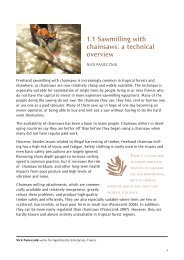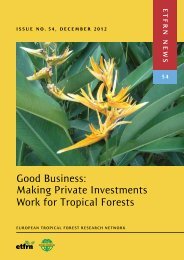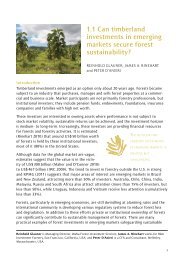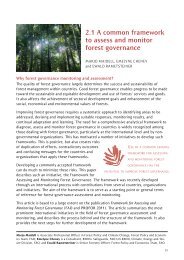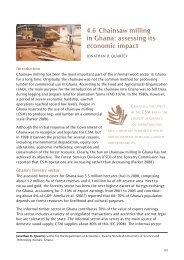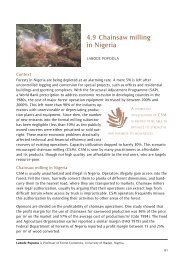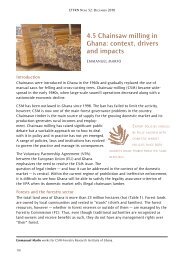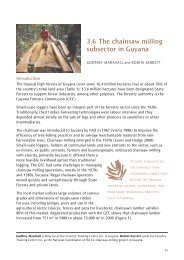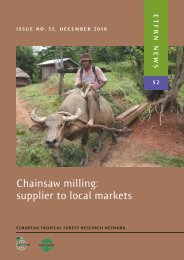Chainsaw milling: supplier to local markets - European Tropical ...
Chainsaw milling: supplier to local markets - European Tropical ...
Chainsaw milling: supplier to local markets - European Tropical ...
Create successful ePaper yourself
Turn your PDF publications into a flip-book with our unique Google optimized e-Paper software.
74<br />
ETFRN NEws 52: DEcEmbER 2010<br />
• puntal is the last part of the culm — it is also used domestically, especially <strong>to</strong> support<br />
crops such as plantain, banana and <strong>to</strong>ma<strong>to</strong>.<br />
The most valuable product, basa, is traded by owners of farms or small companies that<br />
process and sell guadua poles; other products provide additional income for workers in<br />
charge of the harvest (guadueros). The use and sale of these products fulfilll an important<br />
social role, equivalent <strong>to</strong> that of chainsaw <strong>milling</strong> in other kinds of forests.<br />
legal framework<br />
harvesting culms in guadua forest and processing them in<strong>to</strong> low-quality products, such as<br />
esterilla, cepa and puntal, is permitted in Colombia, as long as these products are included<br />
in the harvesting volume authorized by the environmental<br />
authority. This compares <strong>to</strong> chainsaw <strong>milling</strong> in Colombia,<br />
which is permitted if products obtained by this technique<br />
are included in the volume permitted by the environmental<br />
authority.<br />
Illegal logging<br />
according <strong>to</strong> the world bank (2006) illegal logging in<br />
Colombia provides up <strong>to</strong> 40% of <strong>to</strong>tal timber production.<br />
This means that about 1.5 million m 3 of commercialized<br />
timber is illegal. sufficient information is not available on<br />
illegal logging in the guadua forest, although institutions<br />
in charge of control reported that an important amount of<br />
guadua culms is illegally harvested and sold (moreno 2006b). This is due <strong>to</strong> the difficulties<br />
in controlling the large number of small forest patches distributed throughout the coffee<br />
region; in addition, culms are used for domestic purposes in many cases.<br />
The bosques FlEGT/Colombia project, was formulated and led by the Corporación Autónoma<br />
Regional de Risaralda (CarDEr). The project developed an index <strong>to</strong> estimate the extent<br />
of illegal guadua culms traded over a period of time. This index is based on the difference<br />
between the number of guadua culms transported and the number authorized by the Car.<br />
The index is calculated based on infractions related <strong>to</strong> over-quota harvesting (bosques<br />
FlEGT/Colombia 2010). The average percentage of illegally traded culms was estimated<br />
<strong>to</strong> be 29% in risaralda, 37% in Quindío and 25% in Tolima state (bosques/Flegt Colombia<br />
2010).<br />
strategies for improving management and reducing illegal harvesting<br />
a range of strategies has been developed <strong>to</strong> address the situation of guadua forests<br />
and promote its sustainable management. This process has been led by Cars through<br />
projects funded by GTZ (Manejo Sostenible de Bosques en Colombia) and the <strong>European</strong> union<br />
(bosques FlEGT/Colombia). The technological and scientific support of universities,<br />
particularly the Technological university of pereira, has been essential. research results<br />
have been the basis for the development of strategies.



